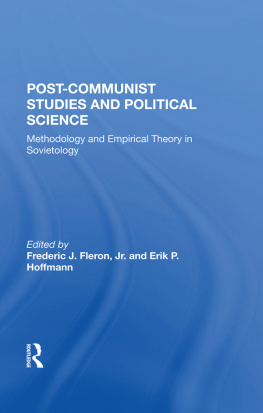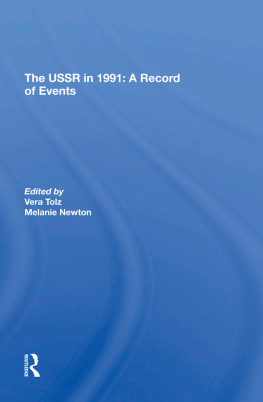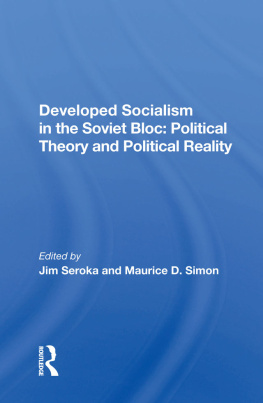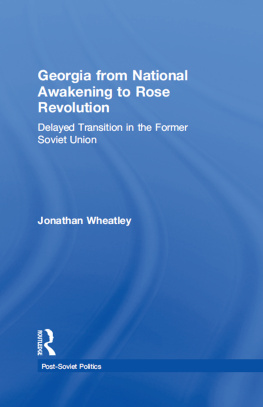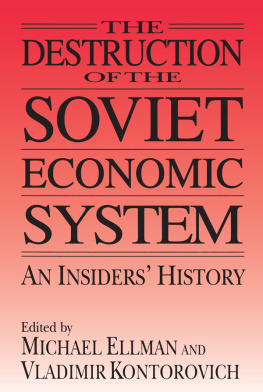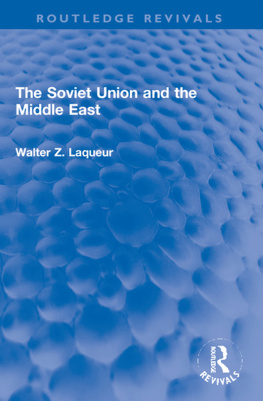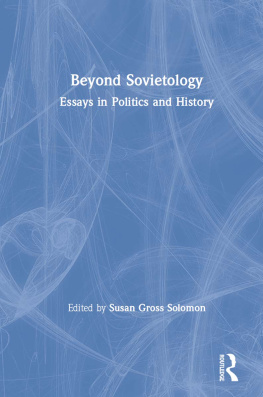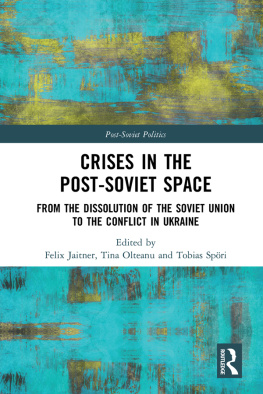First published 1993 by Westview Press
Published 2019 by Routledge
52 Vanderbilt Avenue, New York, NY 10017
2 Park Square, Milton Park, Abingdon, Oxon OX14 4RN
Routledge is an imprint of the Taylor & Francis Group, an informa business
Copyright 1993 Taylor & Francis
All rights reserved. No part of this book may be reprinted or reproduced or utilised in any form or by any electronic, mechanical, or other means, now known or hereafter invented, including photocopying and recording, or in any information storage or retrieval system, without permission in writing from the publishers.
Notice:
Product or corporate names may be trademarks or registered trademarks, and are used only for identification and explanation without intent to infringe.
Library of Congress Cataloging-in-Publication Data
Post-Communist studies and political science : methodology and
empirical theory in Sovietology / edited by Frederic J. Fleron, Jr.,
Erik P. Hoffmann ; foreword by Robert C. Tucker.
P. cm.
Includes bibliographical references.
ISBN 0-8133-1685-5.ISBN 0-8133-1686-3 (pbk.)
1. Soviet UnionStudy and teaching (Higher) 2. Political
science. I. Fleron, Frederic J., 1937-. II. Hoffmann, Erik P.,
1939-.
DK38.8.P64 1993
947.001dc2
92-38893
CIP
ISBN 13: 978-0-367-28396-4 (hbk)
Contents
, Robert C. Tucker
Part One
Introduction
, Frederic J. Fleron, Jr., and Erik P. Hoffmann
Part Two
Methodology and Lessons from the Past
, Gabriel A. Almond and Laura Roselle
, Alexander J. Motyl
, Jack Snyder
, Alexander Dallin
, J. Thomas Sanders
, Alfred C. Meyer
, Joseph R. Berliner
, James R. Millar
, Robert T. Huber and Susan Bronson
Part Three
Empirical Theory and Understanding the Present
, Daniel Deudney and C. John Ikenberry
, Russell Bova
, Thomas F. Remington
, Jeffrey W. Hahn
, John A. Armstrong
, Mark R. Beissinger
, Jerry F. Hough
Part Four
Conclusion
, Frederic J. Fleron, Jr., and Erik P. Hoffmann
Guide
Serious stock-taking is in progress now among practitioners of what has been called Sovietology, meaning studies of the Union of Soviet Socialist Republics. The reason is that the field for the most part had not been expecting what happened in 1991: The USSR collapsed and went out of existence as a unified state system governing a sixth of the worlds territory, having allowed its East European empire to free itself from Soviet dominance somewhat earlier.
It might be said in defense of Sovietology that, by the beginning of the 1980s, it understood that economic and political crises were brewing in the Soviet Union and its outer empire. But the field as a whole failed to grasp the full depth of the systemic crisis in Soviet Russia and the destructive or self-destructive potentialities inherent in it. As the editors of this valuable volume write in the Introduction: Sovietology was not prepared for perestroika and postcommunism.
Perestroika is the name that was given to the reform course adopted by Mikhail S. Gorbachev soon after he came to power in 1985 as general secretary of the Soviet Communist Party. He envisaged a radical reformation of the deeply ailing Soviet order, an effort to cure it of its ills through some measure of liberalizing change. Instead of curing the system, however, perestroika unleashed centrifugal and other forces that in the seventh year of Gorbachevs reign brought the Soviet state formation down to destruction. Now, in late 1992, the ex-USSR consists of the Russian Federation (still a huge country unto itself) and fourteen other Soviet successor states, and communism no longer exists as the official ideology of any of them (although, naturally, no few individuals remain loyal to it).
To say that Sovietology was unprepared for what happened in and to the Soviet Union after 1985 is true if we have in mind the field of Soviet studies as a whole, or the great majority of its members. But fields as a whole are normally characterized by diversity of thinking. Some scholars are likely to arrive at views that differ from widely accepted ones, and in some cases these diverging minds turn out later to have been right. In this instance too, there were a few who, around 1980 or earlier, grasped that the Soviet Union was in a stagnant internal condition with mounting serious problems; that reform was urgently needed; and that radical reform, if instituted, could endanger the system or even lead to its downfall. For such a downfall had happened before in Russian history after a new young tsar, Alexander II, came to the throne in 1855 and instituted some far-reaching reforms, beginning with the abolition of serfdom in 1861. These reforms led to the rise of an antistate revolutionary movement, which in 1917, under wartime conditions, managed to seize power in a coup some months after the tsarist regime had collapsed upon the abdication of Tsar Nicholas II.
One exceptional mind was that of a Soviet dissident named Andrei Amalrik, who decided to become a Sovietologist by analyzing the condition of his own countrys established order. In 1969 he wrote a short treatise called Will the Soviet Union Survive Until 1984? Since such a writing could not be published, due to strict censorship, Amalrik put some copies into hand-to-hand circulation (this practice was called samizdat and had a tradition in tsarist Russia too). For this he was later forced by the authorities into exile abroad. A copy of his essay found its way abroad, however, where it was published and widely read.
Amalrik grasped that the Soviet system was in deep internal crisis and hence in need of radical reform. But he also saw that the systemic crisis had an explosive potential in the event that the country, under conservative rule such as Leonid Brezhnev then offered, should blunder into a foreign war (as it later did in Afghanistan). He imagined that the foreign war would be with China and pictured the USSR self-destructing under its pressure. No war with China came about, of course, yet many events, the Afghan war among them, brought new leadership under Gorbachev, the beginnings of radical reform, and systemic collapse in 1991.
What explains Amalriks capacity to foresee what Soviet Russias future might contain? A part of the answer lies in his professional specialization as a historian of tsarist Russia along with his understanding of the fact that, in some fundamental ways, the Soviet Union after 1917 had retraced the path taken by that earlier Russia of the tsars. What Amalrik saw and intuitively grasped was the potential in twentieth-century Soviet Russia for a repetition of the sequence of events, beginning with Alexander IIs perestroika and ending during World War I, that had brought about the collapse of tsarism.
But all this is just history, the reader may be saying to himself or herself by now. What does it have to do with the subjects of this bookpost-Communist studies and political science, methodology and empirical theory in Sovietology? To this question there is a threefold answer. First, the relation of Soviet Russia to earlier Russian history is the subject of two essays in this volume and hence is properly a topic in which the editors invite the student to take an interest

